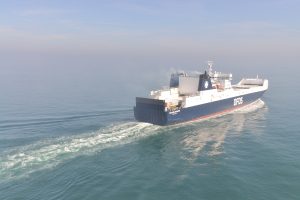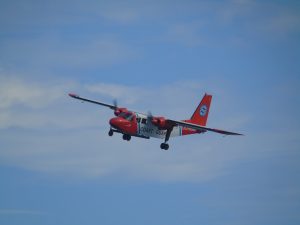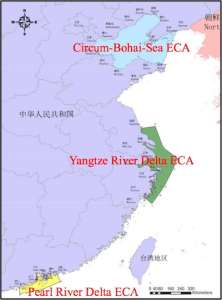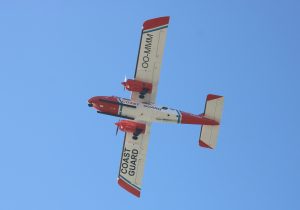Since 2016, a so-called ‘sniffer’ sensor has been used onboard the Belgian Coast Guard aircraft to check for environmental and nautical violations. This sensor allows the sulfur content in the fuel to be derived on the basis of measurements made in the emissions of ships above the sea. This method not only enables more efficient monitoring of aspects of air quality over the sea, but also allows identification of potential offenders. In this context, international attention is increasingly directed at the Belgian example. In addition to the North Sea countries, it is currently mainly China that expresses its interest.

Air pollution by ships and the Belgian pioneering role
Air pollution, and its consequences for people and the environment, receives a great deal of attention in our media. Road traffic is particularly targeted, but often it is forgotten that shipping is also an important source of air pollution (and other forms of pollution). In this way, also sulfur dioxides in the emissions of ships burning sulfur-rich heavy fuels contribute to various public health and environmental issues (particulate matter, acid rain, climate change). The reduction of sulfur emissions from ships at sea is therefore the subject of international conventions (limit on sulfur content in the fuel laid down in the MARPOL Convention, the International Convention for the Prevention of Pollution from Ships), and is a European top priority (European Sulfur Directive). We have previously reported on the sniffer sensor that has been used on board the Belgian Coast Guard aircraft since 2016 to measure the sulfur emissions from ships above the North Sea (the levels of SO2 and CO2 are measured, from which the sulfur content in the fuel can be calculated). The Coast Guard aircraft, owned by the Royal Belgian Institute of Natural Sciences, thus contributes to the efficient enforcement of shipping, in collaboration with FPS Mobility. The unique pioneering role that Belgium plays has not gone unnoticed. For example, there is already active collaboration with the Netherlands and other North Sea countries are also considering to follow the Belgian example.

Intercontinental interest
But the international interest does not stop there! The Belgian performance and expertise also appeared on the radars of countries outside the North Sea basin and the EU. For example, our air surveillance operator Ward Van Roy was invited in September 2017 to present the Belgian pioneering work at an international meeting in the Canadian town of Cornwall (Ontario). The public consisted mainly of government representatives charged with tackling pollution from ships.
In June 2017, also a delegation from the Chinese Ministry of Transport visited the Belgian air surveillance team, to assess the possibility of applying the Belgian procedures in China. Like Europe, China is very much affected by air pollution, and the central Chinese government is now strongly committed to reducing the backlog in the fight against ship emissions. It attributed substantial resources to realise this catch-up movement, and set up three ‘Domestic Emission Control Areas’ (DECAs) around the busiest Chinese ports in 2016. The shipping inspection services were then instructed to tackle the environmental pollution from ships, and therefore the sulfur issue, in these DECAs. The Natural Resources Defense Council (NRDC), an NGO that aims to protect the earth (its people, its plants and animals, and the natural systems that life depends on), supports the Chinese government departments in building up the expertise needed to carry out the monitoring themselves in the future.

Learning from the Belgian experience
In early May 2018, Van Roy was invited by the NRDC and the China Waterborne Transport Research Institute (Department of the Transport Ministry) to discuss the regulation and enforcement of the emissions of ships in the DECA zones at a workshop in Shenzhen, China. The NRDC subsequently organized a workshop and media event in Beijing on 6 June 2018, also celebrating the second anniversary of the Chinese DECA implementation. Once again Ward Van Roy (together with the Dane Jon Knudsen) was selected to share his knowledge about the sulfur theme via teleconference, to explain the Belgian experiences, and to highlight the importance of the Chinese DECA implementation. “We assume that the messages from international experts can help China take more progressive actions and set up a robust monitoring program,” says Freda Fung of NRDC. “Furthermore, we hope that the foreign experiences will be inspiring, not only to further develop and implement the mandatory legal framework, but also to set up voluntary actions to further reduce the sulfur emissions from ships.”
Big in China
The media event was a great success! The Chinese journalists found it very valuable to hear directly from foreign experts how enforcement in their country is being dealt with, and whether new technologies to reduce the sulfur content of ships’ emissions work efficiently. “The Chinese media were also very enthusiastic about the fact that monitoring from the air can effectively be an important link in detecting emission violations at sea, and showed a great interest in the Belgian pioneering work”, says Van Roy. “A few leading Chinese newspapers (including People’s Daily) and many sector-specific media (about shipping, energy and transport), reported on the media event, and quoted the Belgian researcher with regard to various aspects of his story. Ward and the Belgian approach are now famous in China! “Freda adds.
“Ward Van Roy and Jon Knudsen have described in detail how the sniffer technology should be used to effectively monitor the emission of pollutants in the air by ships at sea.”
“Ward Van Roy also provided a clarifying explanation of the effect of desulfurisation scrubbers*, and the fact that they still contribute to pollution when the resulting wastewater is not collected and purified, but discharged directly.”
China Shipping Weekly, 06-07-18
“The international interest in the Belgian pioneering work gives us a great deal of satisfaction and extra motivation to proceed on the chosen way, both in relation to our work assignment and fed by our concern for the quality of our environment, of which air quality is also an important part.” Van Roy concludes.

Future perspectives
In the meantime, the scientists of the Belgian air surveillance team are looking into the possibilities to expand their expertise with the measurement of nitrogen compounds in the emission of ships at sea, for which stricter standards will apply from 2021 onwards. They also continue to inform other North Sea countries and the European Commission about the usefulness of ‘sniffer’ flights above the sea, hoping that the practice will be extended not only to China but also around the North Sea (and to other European sea areas) in the coming years.
* Scrubbers are installations in which water removes unwanted pollutants from a gas flow. When that water is not collected after treatment, it is called an ‘open system’, in the other case a ‘closed system’.
